SPEAKERS
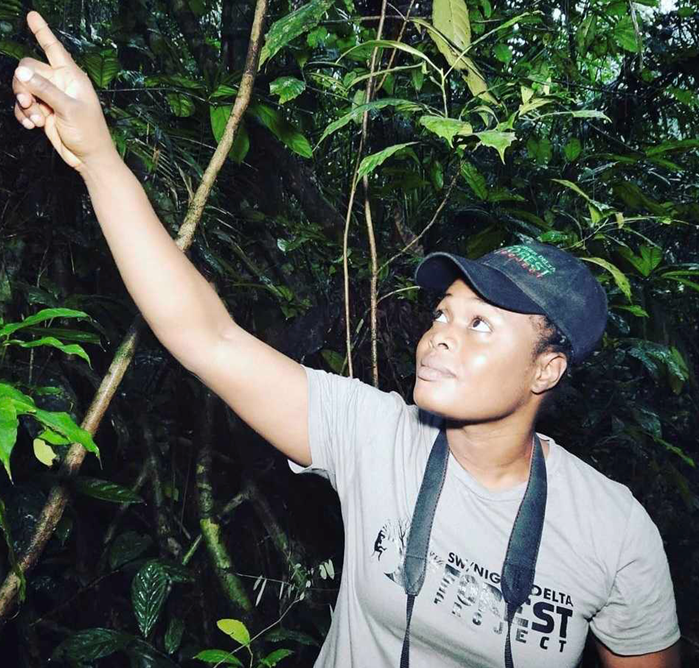
Rachel Asegbofeh Ikemeh is a
Whitley Award-winning conservationist and Founder/Director at the
Southwest Niger Delta Forest Project, a grassroots-focused conservation
initiative that has been dedicated to the protection of fragile
wildlife populations and habitat across her project sites in Africa’s
most populous nation. Rachel won the award in 2020 for her work on
chimpanzee populations in Nigeria and is aiming to secure 20% of
chimpanzee habitat in Southwest Nigeria. She is also the winner of the
National Geographic Society Buffet Awards for Conservaton Leadership in
Africa, a Tusk Conservation Awards Finalist. She works to protect some
of the most highly threatened forest habitats and primate populations in
southern Nigeria. For example, Rachel’s determined efforts has helped to
bring back a species from the brink of extinction – the rare and
critically endangered Niger Delta red colobus monkey, also, considered
one of 25 most endangered primates in the world. She has helped to
establish two protected areas and have also taken on the management of
these PAs to restore habitats in these very highly threatened ecosystems
which are also areas of high-security risks in the country. Rachel is
the Co-Vice Chair for the IUCN/SSC Primate Specialist Group African
Section and Member of the International Primatological Society (IPS)
education committee. Through her strategic positions in these networks,
Rachel has been committed to championing the need to increase
conservation leadership amongst Africans as she co-founded the African
Primatological society in 2017. She’s trained the 55 persons that make
up her team from local institutions and local communities.
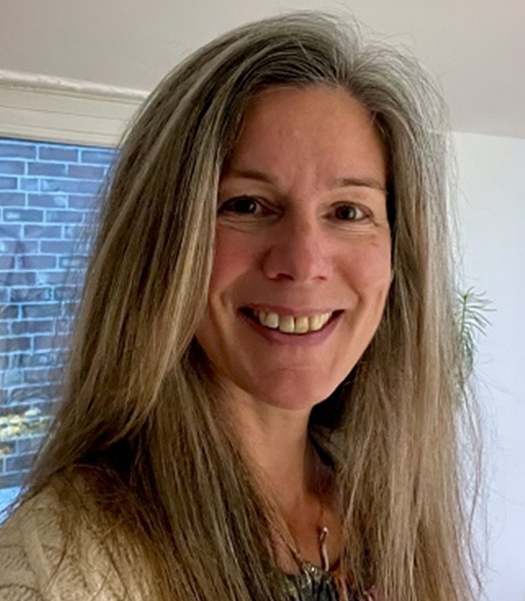
Since 1996,
Joanna Setchell
research has integrated methods including behaviour, morphology,
demography, genetics, endocrinology, semiochemistry and dental histology
to address questions relating to reproductive strategies, life history,
sexual selection and signalling in primates. The majority of this work
has focused on a semifree-ranging colony of mandrills, housed at the
Centre International de Recherches Médicales, Franceville (CIRMF),
Gabon. For more about our long-term studies of mandrills, please see
this review, and this summary. She has also conducted primate fieldwork
in Cameroon, Republic of Congo and Sabah, Malaysia, including personal
experience of conservation issues and primate reintroductions. Her
research is increasingly focused on human-wildlife coexistence and
biodiversity conservation. She’s convinced that conservation must be
underpinned by a deep understanding of the historical, political and
social context. Her current work is in collaboration with Save Gabon's
Primates to promote the conservation and welfare of primates in Gabon.
She has a long-standing interest in the practice and ethics of primate
research. She co-edited a book on Field and Laboratory Methods in
Primatology with an explicit focus on ethics, helped to develop the
International Primatological Society's Code of Best Practices in Field
Primatology, and lead the establishment of a new IPS Vice-President for
Equity and Ethics. Her recent book, Studying Primates, has a strong
focus on equity, ethics and integrity. As President of the Primate
Society of Great Britain, She is focused on the need to decolonize our
discipline.
She is a Professor in the
Department of Anthropology she joined Durham Anthropology in 2007. She
have a PhD in Zoology from the University of Cambridge, and moved into
Anthropology via post-doctoral research at the Centre for Research in
Evolutionary Anthropology at Roehampton University and in the Department
of Biological Anthropology at the University of Cambridge, and a
temporary lectureship in Anthropology at University College London. She
teaches biological and evolutionary anthropology at undergraduate and
postgraduate levels. She won two awards for doctoral supervision. Also
served on the University Senate as an elected representative of the
Academic Electoral Assembly, and as Director of the MSc in Evolutionary
Anthropology, Chair of the Exam Board, Director of Research, Inclusion
Diversity and Equity champion, and Director of Postgraduate Research in
my department.
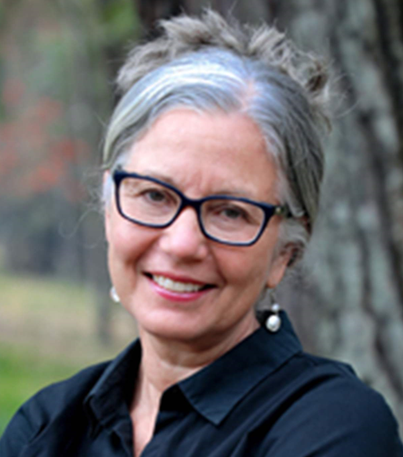
Beth Kaplin is a biodiversity conservation scientist
currently serving as the first Director of the Center of Excellence in
Biodiversity & Natural Resource Management at University of Rwanda (UR)
since 2017. This is a relatively new knowledge management research
center with UNESCO Category 2 Center status aimed at contributing
science to policy. Beth is a Professor of Conservation Science at UR,
and supervises BSc, MSc and PhD students at UR and other academic
institutions. She is an affiliated Research Professor in the School for
the Environment and Senior Fellow at the Center of Global Governance and
Sustainability, both at University of Massachusetts-Boston. She is
currently President of the Association for Tropical Biology and
Conservation. She received her BSc in wildlife biology from Colorado
State University, and MSc and PhD in Zoology from University of
Wisconsin-Madison. From 2006 to 2015, she raised over 1 million USD from
the MacArthur Foundation to develop BSc and MSc programs in biodiversity
conservation at National University of Rwanda. She also created the
Regional Network for Conservation Educators in the Albertine Rift to
support and empower conservation scientists in Rwanda, Burundi, DRC,
Tanzania, and Uganda with MacArthur Foundation support. Beth maintains a
research program with her students on tropical forest ecology, seed
dispersal, primates, protected areas conservation, ecosystem services,
climate adaptation, and human-wildlife interactions that began in 1990
when she first came to do research in Nyungwe forest, Rwanda. Under her
direction, the Center manages ~USD$ 2 million in externally raised funds
for research and projects annually, and she oversaw the revitalization
of the National Herbarium of Rwanda which holds over 20,000 specimens.
She is interested in evaluating and monitoring effectiveness of
ecosystem-based adaptation and landscape restoration initiatives and is
working with colleagues to develop the Rwanda Biodiversity Information
system. Dr. Kaplin has focused her career on the role of higher
education in building capacity for biodiversity conservation and climate
adaptation research in Africa. She lives in Rwanda with her husband and
visits their family home in Vermont, USA whenever possible.
She has been fortunate to participate in several
workshops on active teaching and student-centered learning, primarily
through the Center for Biodiversity at the American Museum of Natural
History. She delivers teacher training workshops in various contexts
across the USA and Africa, and she is passionate about integrating
active, student-centered teaching methods into her classrooms. She has
developed undergraduate, Master’s, and PhD-level courses and programs of
study in biodiversity conservation and environmental studies at various
institutions in the USA and Africa. She teaches courses in ecology,
research methods, conservation biology, community conservation,
professional skills, and tropical ecology. Additionally, she has led
field study trips in Costa Rica, the USA (including Florida, Vermont,
New Hampshire), and East and Central Africa.
Elle a eu la chance de
participer à plusieurs ateliers sur l'enseignement actif et
l'apprentissage centré sur l'étudiant, principalement par
l'intermédiaire du Centre pour la biodiversité du Musée américain
d'histoire naturelle.
Elle anime des ateliers de formation d'enseignants
dans divers contextes aux États-Unis et en Afrique, et elle est
passionnée par l'intégration de méthodes d'enseignement actives et
centrées sur l'étudiant dans ses classes.
Elle a développé des cours et des programmes
d’études de premier cycle, de maîtrise et de doctorat en conservation de
la biodiversité et en études environnementales dans diverses
institutions aux États-Unis et en Afrique.
Elle donne des cours sur l'écologie, les
méthodes de recherche, la biologie de la conservation, la conservation
communautaire, les compétences professionnelles et l'écologie tropicale.
De plus, elle a dirigé des voyages d'études
sur le terrain au Costa Rica, aux États-Unis (notamment en Floride, au
Vermont et au New Hampshire) et en Afrique de l'Est et centrale.
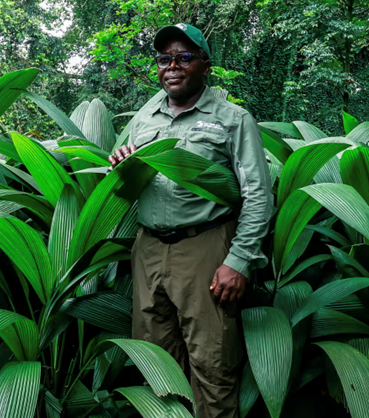
Ekwoge Abwe is a San Diego Zoo Wildlife Alliance
scientist, co-leader of SDZWA African Forest Hub and manager of the
Cameroon Biodiversity Association (CAMBIO). His research interest
focuses on niche separation in primate species in the Ebo forest
(rainforest) and Mbam & Djerem National Park (forest-woodland-savanna
mosaic), Cameroon. His major role as manager of the CAMBIO is to
coordinate research activities in the
Ebo forest and Mbam & Djerem National Park, and to guide conservation
education and outreach in communities around the sites. Ekwoge is
passionate about primates, particularly great apes, and was the first
to witness chimpanzees smashing nuts in Cameroon – a new behavioral
discovery for the Nigeria-Cameroon chimpanzee.
Ekwoge earned his bachelor’s degree in Geography
from the University of Yaoundé 1 in Cameroon 1995. He then taught at
secondary school before starting a conservation career with WWF
Cameroon as a GIS specialist in 1998. He subsequently joined the SDZWA
Central Africa Program 2003, working in the Ebo forest on several
tropical forest primates, including chimpanzees, gorillas and drills.
In 2010, he earned his master’s degree in Primate Conservation at
Oxford Brookes University, UK, winning a habitat country scholarship
in the process. He earned his doctoral degree at Drexel University,
Philadelphia, with a primary focus on how genetic and ecological
variation are linked with the behavioral ecology of the
Nigeria-Cameroon chimpanzee.
Ekwoge earned his bachelor’s degree in Geography
from the University of Yaoundé 1 in Cameroon 1995. He then taught at
secondary school before starting a conservation career with WWF
Cameroon as a GIS specialist in 1998. He subsequently joined the SDZWA
Central Africa Program 2003, working in the Ebo forest on several
tropical forest primates, including chimpanzees, gorillas and drills.
In 2010, he earned his master’s degree in Primate Conservation at
Oxford Brookes University, UK, winning a habitat country scholarship
in the process. He earned his doctoral degree at Drexel University,
Philadelphia, with a primary focus on how genetic and ecological
variation are linked with the behavioral ecology of the
Nigeria-Cameroon chimpanzee.
Ekwoge was honored with the prestigious Whitley
Fund for Nature Award in 2013, The Explorers Club 50 Award in 2022 and
Prince William Award for Conservation in Africa in 2023 for his
grassroots efforts to engage local communities in great ape
conservation in Cameroon. He serves as secretary general of the
African Primatological Society and co-vice chair of the IUCN Section
on Great Apes.
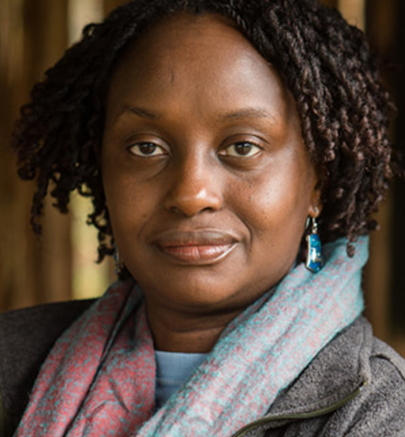
Dr. Gladys Kalema-Zikusoka
is one of the leading conservationists and scientists working to save the critically endangered mountain gorillas of East Africa. She is founder and Chief Executive Officer of Conservation Through Public Health (CTPH), a 16-year old nonprofit organization that promotes conservation by improving the quality of life of people and wildlife to enable them to coexist in and around protected areas in Africa. She became anAshoka Fellow in 2007 for merging Uganda’s wildlife management and
rural public health programs to create common resources for both people
and animals.Dr. Gladys trained as a veterinarian at the University of
London’s Royal Veterinary College. Between 1996 and 2000, she set up the
first Veterinary Unit at the Uganda Wildlife Authority. From 2000 to
2003, she completed a zoological medicine residency and masters in
specialized veterinary medicine at North Carolina State University and
North Carolina Zoological Park. Prior to setting up CTPH she also did a
certificate in Non-profit management from Duke University. Most recently
in 2016, she completed an MBA in Global Business and Sustainability –
Social Entrepreneurship Track.
Under her leadership, Conservation Through Public
Health won the Global Development Network 2012 Japanese Most Innovative
Development Project Award for scaling social service delivery. Dr.
Gladys recently became a National
Geographic Explorer and winner of the Sierra Club’s
2018 EarthCare Award. 2019 Finalist
for the Tusk
Award for Conservation in Africa ,the
2020 Uganda Veterinary Association World Veterinary Day Award and the 2020
Aldo Leopold award. She is on
the leadership council of Women for the Environment in Africa.
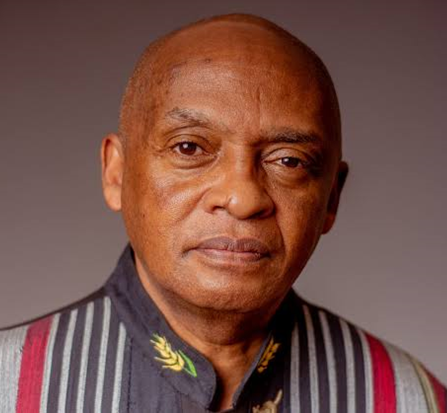
Pr. Jonah Ratsimbazafy is a native
of Madagascar. He received his PhD in Physical Anthropology from the
State University of New York at Stony Brook. He is an Adjunct Professor
at the University in Madagascar. Currently, he is the President of the
International Primatological Society (IPS). He is also the President of
the Madagascar Primate Research Group (GERP), the Director of the
Houston Zoo Madagascar Programs, a co-Vice-Chair of the IUCN/SSC Primate
Specialist Group-Madagascar, a National Geography Explorer, counselor of
the Lemur Conservation Network, a member of the advisory board for
African Primatological Society (APS) and a representative of CITES. He
is a fellow member of the African Academic of Sciences (AAS) and the
World Academic of Sciences (TWAS).
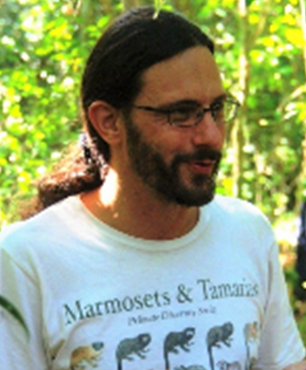
Leandro Jerusalinsky Leadro Jerusalinsky earned his degrees as Bachelor in Biological Sciences (UFRGS, 1997), Master in Genetics and Molecular Biology (UFRGS, 2001) and Doctor in Biological Sciences - Zoology (UFPB, 2013). Environmental Analyst since 2003, at the Brazilian Institute for the Environment and Renewable Natural Resources (IBAMA, 2003-2007) and the Chico Mendes Institute for Biodiversity Conservation (ICMBio, 2007-present), both autarchies linked to the Brazilian Ministry of Environment. Head of the National Center for Research and Conservation of Brazilian Primates (ICMBio/CPB) since 2009. Deputy Chair of the IUCN SSC Primate Specialist Group. Member of the IUCN SSC Conservation Planning Specialist Group. Member of the Brazilian Society of Primatology (SBPr) Council. Former President (2018-2021) and former Secretary (2015-2017) of the Latin American Society of Primatology (SLAPrim). Collaborating researcher of the Urban Monkeys Program (UFRGS). Its main areas of expertise are: Neotropical Primate Conservation, Primatology, Strategic Planning for Conservation, and Conservation Biology.
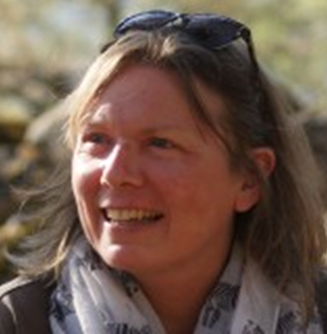
Sian Waters have been working with wildlife for over
30 years, specialising in primate conservation issues and now an
independent consultant. She has graduate and
post-graduate qualifications in Psychology and Biological Science from
the University of Wales. Her PhD thesis assessed the benefits of using
ethnographic data to drive conservation strategy in Barbary macaque
habitat in Morocco. Her inclusive approach greatly increased
the efficiency and long term sustainability of our
conservation initiatives by identifying social and cultural obstacles to
conservation, meaningful engagement and inclusion of local stakeholders
leading to pro-conservation behaviour change.
Her research focuses the complex
facets of human-wildlife coexistence particularly human-animal relations
as well as people's perceptions of wildlife conservation. She is the
Co-vice-chair of the IUCN Primate Specialist Group's Section for
Human-Primate Interactions, and a member of the core team of
the IUCN Conservation Translocation Specialist Group Section
for human-wildlife interactions. Fieldwork experience includes Belize,
Cambodia, Canada, Laos, Mauritius, Morocco, USA, Venezuela and
Vietnam. She is a native English speaker and also fluent in Spanish and
Italian and fairly skilled in the use of social media.
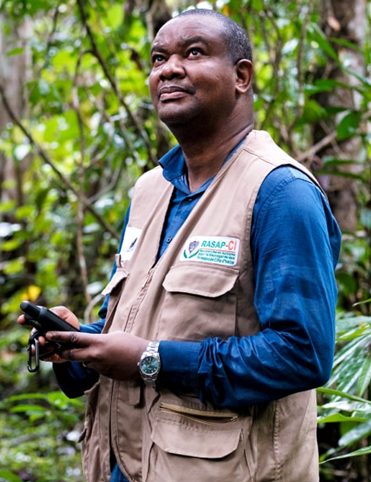
Pr.Inza Koné (Côte d’Ivoire) is
Director General of the Centre Suisse de Recherches Scientifiques
(CSRS), President of the African Primatological Society (APS) and
Co-Vice Chair of the Africa Section of the IUCN/SSC Primates Specialist
Group (PSG).
Inza Koné is a Full Professor of
Conservation Biology at the Université Félix Houphouët-Boigny, Abidjan,
Côte d’Ivoire. Since July 2018 he has been Managing Director of the
Centre Suisse de Recherches Scientifiques en Côte d’Ivoire (CSRS). His
work focuses on the management of natural resources and the conservation
of large mammal species, especially primates. This work makes links
between ecology, economy, and culture for the empowerment of rural
communities. Inza has won several international and national awards,
including the 2009 Future for Nature Award (the Netherlands), the 2012
Whitley Award for Nature Conservation (UK), the 2015 National Research
Award (Côte d’Ivoire), the 2020 Presidential Award of the International
Primatological Society, and the Officer Medal in the order of merit of
national education in Côte d’Ivoire. He is active in several
international professional organizations, including as President of the
African Primatological Society since 2017, co-Vice Chair of the Africa
Section of the IUCN/SSC Primate Specialist Group, a member of several
committees of the International Primatological Society, a member of the
IUCN/SSC Hippopotamus Specialist Group, a member of the Regional
Advisory Committee of the Biodiversity and Protected Areas Management
(BIOPAMA) program for West Africa, and Chairman of the Group of
Evaluators for the Green List of Protected Areas in Côte d’Ivoire
(IUCN). He has authored over 100 publications in the fields of
primatology, conservation, behavioral ecology, and environmental
education. He recently won the Rolex Awards for
Enterprise support of exceptional individuals who have the courage and
conviction to take on major challenges, initiating extraordinary
projects that make the world a better place.
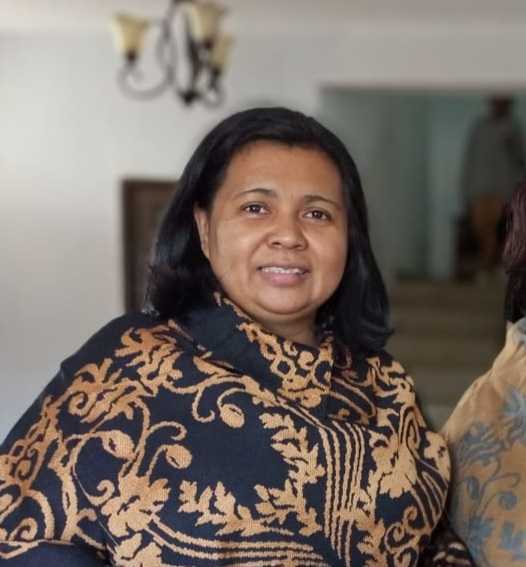
Josia is a primatologist specializing in holistic approaches to biodiversity conservation in Madagascar. She earned her PhD in 2011, focused on the ecological niche between ring-tailed and brown lemurs. Then, she launched the “Sifaka Conservation” project, which received several international awards, including the Whitley Award. She then founded the organization IMPACT Madagascar to sustain the community conservation program linked to this project. Josia also led the globally recognized environmental management program at the Ambatovy mining company. During her eight years at Ambatovy, she managed a large team and international consultants, contributing to remarkable delivery of biodiversity gains for the company and Madagascar. For the past two years, she has worked at Maliasili, where she supports local organizations in becoming more structured, results-oriented, and rigorous in their pursuit of success. She also supports education in Madagascar, particularly at the University of Antananarivo, where she teaches on sustainable development, a field she considers essential for driving positive change in the country.




Dear visitor
We are happy, that you are interested in finding information about this event.
Very probably you are using the Internet Explorer Version 6. This browser is out of date and is not able to handle the current web standards. Microsoft has asked users to update to a newer version of this browser as it is no longer supported by Microsoft: www.ie6countdown.com.
To enjoy the full content of this and many other internet websites, kindly update to an up to date version of your internet browser.

